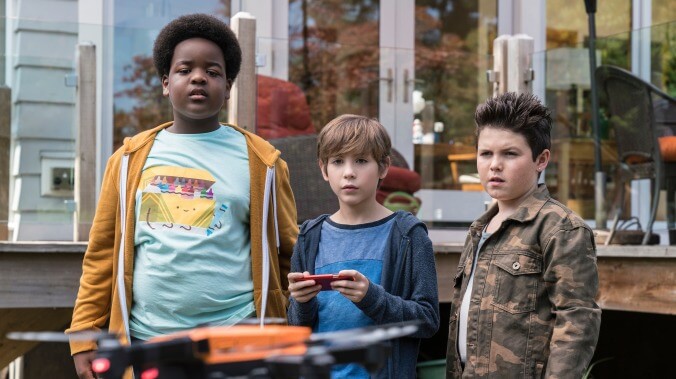Good Boys puts a tween spin on the R-rated teen comedy, to mostly funny effect


The hook of Good Boys, Hollywood’s latest odyssey of comic adolescent mischief, is that the kids behaving badly are, for once, truly kids. The usual R-rated parade of randy mishaps, drug-related foibles, and foul-mouthed banter has formed around characters just out of elementary school. That may sound like a minefield of taboos (or maybe, given the two decades of South Park, really no big deal). But in this variation on Superbad’s wild night of transgression, downshifting the age of the protagonists from teen to tween actually only enhances the stealth, wide-eyed innocence that secretly drives this genre of pre-college hedonism. Parents could watch the movie, in other words, and leave feeling relieved, not shocked. “Thank God,” they might think, “that 12-year-olds are still terrified of beer and grossed out by porn.”
Both are true of the young heroes of Good Boys, whose title accurately describes the three generally trouble-avoiding sixth-grade besties. Of the group, Max (Room’s Jacob Tremblay) is the most nominally mature, at least biologically speaking; unlike his childhood companions, he’s entered the early throes of puberty, and spends a lot of his waking hours pining, rather chastely, for a classmate (Millie Davis). Thor (Brady Noon) is going through changes of a more social sort, feeling pressured to abandon his interest in musical theater for cooler pursuits, especially after a failure of after-school nerve earns him the potentially catching nickname “Sippy Cup.” Rounding out the trio is the painfully sheltered and rule-obsessed Lucas (Keith L. Williams), coping with the sudden, crushing revelation that his parents are getting divorced.
The preteen stars develop an organic and winningly uncool rapport, that shared language of misfit middle-school camaraderie. (Williams, who had a regular role on The Last Man On Earth, scores the biggest laughs as the group’s alarmed moral center.) Their chemistry helps carry Good Boys over the rougher patches of its ambling plot, which centers on a “kissing party” (the first word inspires a swell of funny horror-movie strings each time it’s uttered) to which Max is invited. Finagling a plus-two for his companions, witheringly described as “random” by the cool-kid host, Max fears that he won’t know how to kiss—an anxiety that sends the three into a spiral of farcical complications involving his dad’s prized drone, a cache of sex toys, and some ecstasy pills the trio ends up stealing as leverage in their conflict with two teenage girls (Molly Gordon and Midori Francis) from the neighborhood. (In one of the film’s more inspired choices, these ostensible villains approach their new, pint-sized nemeses with a mixture of mild amusement and casual exasperation.)
Last year, Eighth Grade found poignancy and humor in its eponymous time period: that purgatorial perch between childhood and adulthood. Watching Good Boys, you realize what a difference two years makes. Both in stature and mindset, Max and his friends are still very much kids, mostly uncorrupted by the growing preoccupations and desires of teenage life. Director Gene Stupnitsky, who co-wrote the script with frequent collaborator Lee Eienberg (the two previously penned the screenplays for Bad Teacher and Year One—don’t worry, this is a big improvement on both), builds most of the comedy around how hopelessly green and cloistered the boys are. Their big pilgrimage to the mall is just four miles, which feels like an impossibly vast distance to them; when they get there, they’re nearly thwarted by the danger of… crossing the highway. Good Boys, which transports the one-crazy-night scenario to the less-crazy day, finds humor not in the spectacle of children passing adult barriers, but in them obliviously maintaining their innocence even when getting mixed-up in a frat-house drug deal or stumbling upon a sex doll.
One could argue, of course, that most comedies about the risqué misadventures of teenagers are actually pretty wholesome. Horny hits like American Pie and last year’s Blockers are, at heart, sweet coming-of-age stories, secretly reassuring everyone that the kids are all right—that no matter how many f-bombs they drop, no matter how raunchy their MPAA-antagonizing hijinks get, they’re really just fumbling their inexperienced way through normal rites of passage. Produced by none other than Seth Rogen and Evan Goldberg, Good Boys again most closely resembles a kind of junior-varsity tryout for that duo’s Superbad, down to its modestly affecting emotional through-line: an acceptance of the fact that childhood friendships, forged out of proximity and convenience, aren’t always destined to last. Yet as with Booksmart, the summer’s earlier riff on that Apatovian classic, there are times when Good Boys feels a little too nice to actually be uproarious. In more ways than one, it’s the training wheels for a better comedy—a slightly edgier and funnier one.